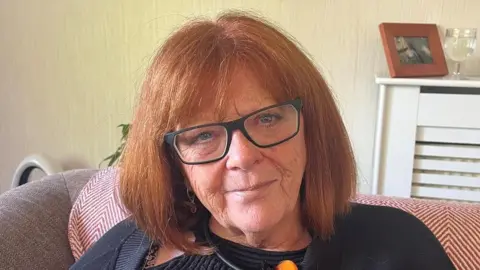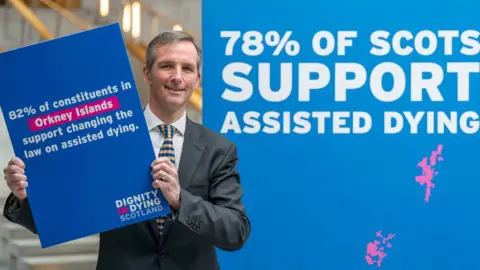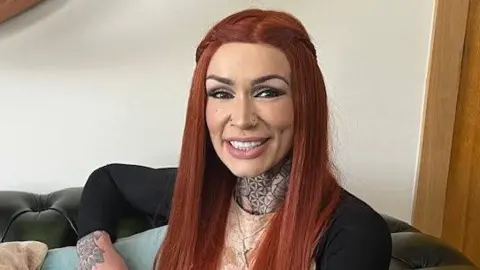How do Scots feel about the assisted dying bill?
 BBC
BBCAs the Scottish Parliament prepares to vote on plans to legalise assisted dying, families have spoken out about their view on the controversial bill.
The proposal, tabled by Liberal Democrat MSP Liam McArthur, would allow terminally-ill adults to seek medical help to end their lives.
Supporters include Tricia Donoghue, a nurse from Cumbernauld who watched her husband suffer for months after he was diagnosed with a rare form of bile duct cancer.
However opponents fear the bill could endanger vulnerable members of society who might feel like a burden to their caregivers.
The proposed legislation would allow a patient to request medical help to end their life if they had a terminal illness and had been ruled mentally fit to make the decision by two doctors.
The stage one vote is on the general principles of the bill, and another vote on the final draft of the bill would be held before it could become legislation.
Ten years after her husband died, Ms Donoghue hopes to see the Scottish Parliament legalise what she says would be a "better death" for other people facing a terminal illness.
Kevin Donoghue passed away 18 months after he was diagnosed with the rare cancer.
The retired nurse from Glasgow said her husband had shown some symptoms of a liver condition, like abdominal pain and jaundice, but it took several blood tests and scans to diagnose him.
"Within weeks, his health deteriorated," said Ms Donoghue, 70. "He went from a healthy active individual to the bile ducts just closing over.
"He was just getting worse at home. He dropped weight and was completely yellow, he just had a horrible time.
"He never had a good day and then he was in the hospital for six months and everything went wrong really."
'He was in a lot of pain'
Mr Donoghue had surgery to help his condition which meant he had to re-learn how to eat, dress and wash.
He was eventually able to return home, however doctors later discovered he had a blocked bile duct.
The family was told he was too unwell to get surgery to fix it and he decided to go into a hospice for end-of-life care.
"The last three weeks were pretty awful," said Ms Donoghue. "He wasn't allowed to eat or drink because of the blocked bile duct and he was very thirsty so he had a tube down his nose.
"He was in a lot of pain but he was very alert so I didn't think that he was actively dying for a long time. He didn't get the opportunity to go the way he wanted to go."
She said the family was with him every day but occasionally left the hospice to get supplies. On one of these trips, Ms Donoghue received a phone call to say her husband had died.
"We were all a bit stunned," she said. "We went back to see him and Kevin just looked like himself. He didn't look ill, he looked very peaceful.
"I found it very difficult to accept that I wasn't with him when he died after being with him constantly for 18 months."
 PA Media
PA MediaMs Donoghue said that her husband should have been given the chance to decide how his life would end.
She said she believed most people in Scotland would want the power to decide how they would die if they faced a terminal illness.
Ms Donoghue added: "After being a nurse for many years, some people have a good death and some people just don't - even with really good hospice care.
"I think robust safeguarding reduces risk - and there is a risk - but I don't think its enough that we shouldn't take the bill forward."

Michelle Moffatt, also a former nurse, told BBC Scotland News that she was against the assisted dying bill.
The mum-of-four from Dumbarton injured her back while bending over to pick up a pen when she was on shift at the Golden Jubilee Hospital in Clydebank in 2019.
"It resulted in a spinal cord injury and has left me paralysed from the waist down," she said.
"I'm now in a wheelchair and have other issues that run alongside that. My life changed dramatically in an instant and I really struggled to come to terms with that."
Ms Moffatt, 43, said she became depressed with her quality of life when she failed to see any improvements in her mobility.
She could no longer work as a nurse or do activities like cycle with her children, and her injury meant she was in pain everyday.
"I didn't want to be a financial burden and a care burden on my family," she said. "I felt like I had no value and I wasn't worth anything any longer.
"I joined Dignitas in Switzerland in 2022 and I was obviously depressed and didn't know what to do.
"In my head, the only options were suffer, suicide or Switzerland - so I chose Switzerland."
'The law protected me'
She told her husband about her plan to end her life and how it meant he could find a "new wife" who was "good with the kids".
Ms Moffatt said: "I remember he looked horrified and so angry and said 'how could you do this to us?'
"When I think about what I said, it was terrible, but it shows the headspace I was in at the time."
After speaking to her GP, Ms Moffatt was given psychological help and directed to a charity called Spinal Injuries Scotland.
She told BBC Scotland News: "It was the first time I met people who also had spinal cord injuries, some much more severe than mine, and they were living amazing lives.
"Now I'm so grateful that the law protected me against myself.
"I feel like this bill that's being proposed is unsafe, undignified, unnecessary and totally unwise. It puts a lot of pressure on the most vulnerable of our society."
She said it was important to offer better wraparound care for anyone diagnosed with a life-changing illness, as well as improve palliative care for terminal patients.
Ms Moffat added: "If people have the right support at the right time from the right professional, their outlook can totally change and I'm proof of that.
"Compassion for me is standing alongside someone during their suffering, not terminating their life. It's about having quality of life until the end of your life."
